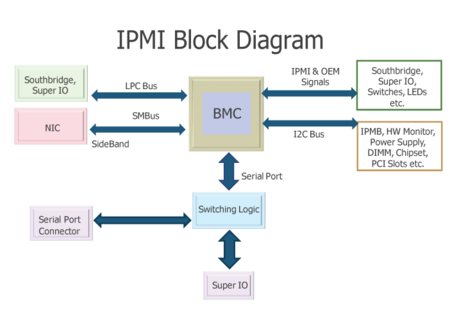IPMI - Intelligent Platform Management Interface
The Intelligent Platform Management Interface (IPMI) is a remote hardware health monitoring and management system that defines interfaces for use in monitoring the physical health of servers, such as temperature, voltage, fans, power supplies and chassis.
The baseboard management controller (BMC) provides the intelligence in the IPMI architecture. It is a specialized microcontroller embedded on the motherboard of a computer – generally a server. The BMC manages the interface between system-management software and platform hardware.
Different types of sensors built into the computer system report to the BMC on parameters such as temperature, cooling fan speeds, power status, operating system (OS) status, etc. The BMC monitors the sensors and can send alerts to a system administrator via the network if any of the parameters do not stay within pre-set limits, indicating a potential failure of the system.
The administrator can also remotely communicate with the BMC to take some corrective actions – such as resetting or power cycling the system to get a hung OS running again.
Physical interfaces to the BMC include SMBuses, an RS-232 serial console, address and data lines and an Intelligent Platform Management Bus (IPMB),
How does IPMI work?
- A separate processor called a Baseboard Mgmt Controller (BMC) runs along side the core/main processor in a system to allow monitoring of the system’s status, environmental info, etc internally, regardless of the health of the core processor.
- The BMC communicates with the system board both internally and externally, to provide for remote management and monitoring of the system.
- IPMI is a self-describing environment, providing for easy integration into third party software applications
No comments:
Post a Comment